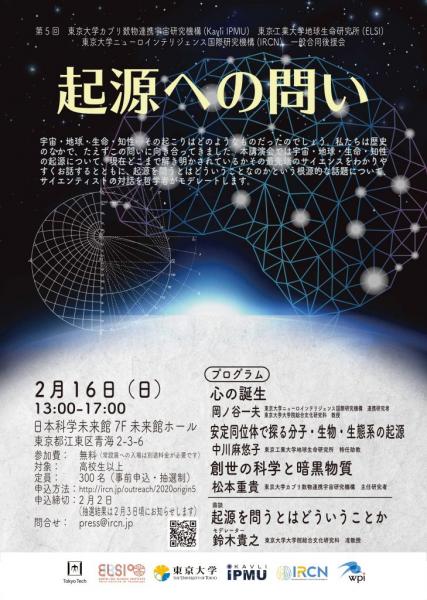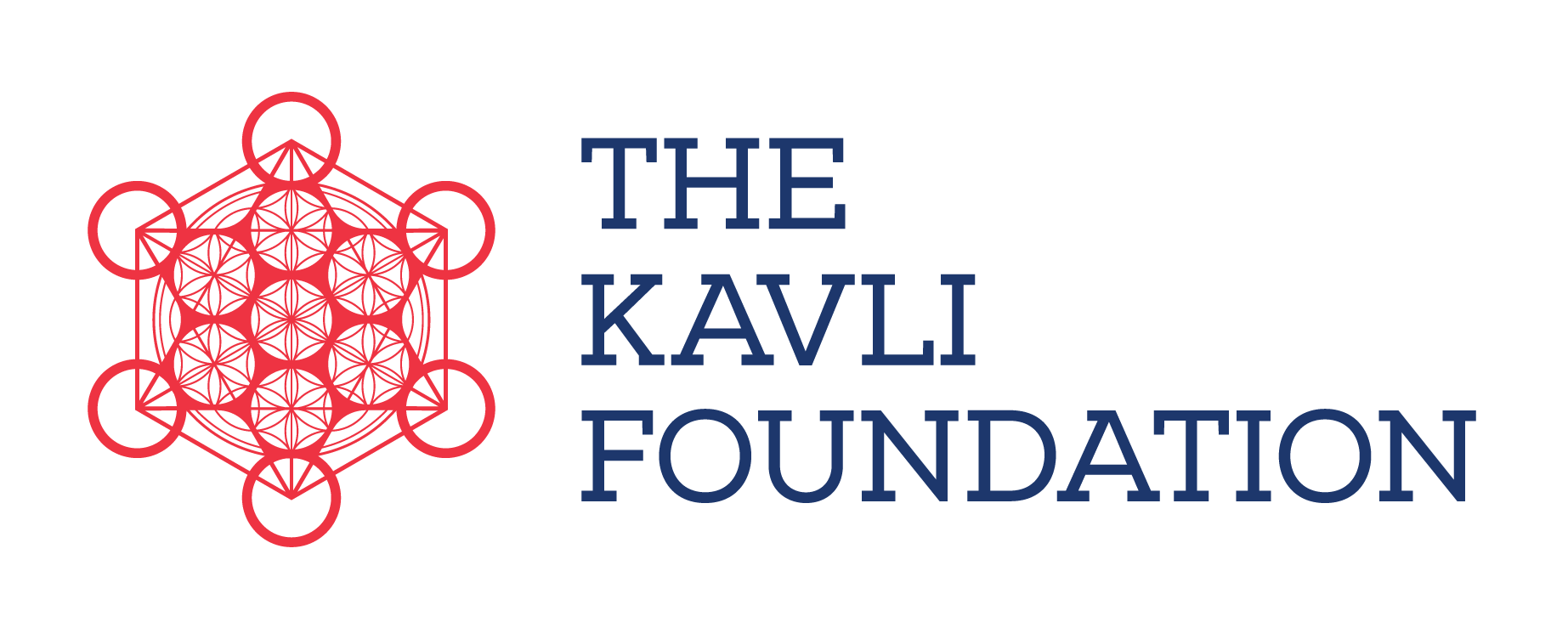January 22, 2020
Kavli Institute for the Physics and Mathematics of the Universe (Kavli IPMU)
On February 16 (Sun), we invite you to come to the Miraikan in Tokyo to take part in the 5th Public Lecture series "A Question of Origins", jointly hosted by the Kavli Institute for the Physics and Mathematics of the Universe (Kavli IPMU), the Tokyo Institute of Technology's Earth-Life Science Institute (ELSI), and for the second time, the University of Tokyo's International Research Center for Neurointelligence (IRCN).
The Universe, Earth, Life. How did it all begin? Throughout history, humans have always asked this question.
In this event, researchers will talk about how far science has come to uncover the origin of the Universe, of Earth, and of Life. They will also be joined by a philosopher to discuss and think about what it means to look for an origin.
This event will be in Japanese.
Program
13:15-13:50
Lecture 1
The Birth of a Mind
Speaker: Kazuo Okanoya (IRCN Affiliated Faculty, University of Tokyo Graduate School of Arts and Science Professor)
The mind is a subjective experience of existence, and one can only infer the minds of others. Is the mind something that evolved by natural selection, or is it a process corresponding to behavior? In this talk we will look into research studying animal minds. Do non-human animals understand time, do they empathize with others, do they manage their own memories in order to select the best course of action, and can they exchange their own actions for the ones of outsiders. We will use these studies to infer animal minds, and then, the evolutionary processes that produced a mind. We will also look into whether AI can have a mind of its own.
13:55-14:30
Lecture 2
Studying the origin of molecules, living organisms, and ecosystems Using stable isotope ratios
Speaker: Mayuko Nakagawa (ELSI Specially Appointed Assistant Professor)
In order to understand what sort of environment, and what sort of ecosystems have come and gone throughout the Earth's 4.6 billion year history, we geochemists analyze the chemical information lying within rocks that have been around since the Earth's beginning. It requires one to study the laws governing atoms and molecules in order to understand the material cycle of modern day Earth, from a single cell and all the way to the entire Universe. In particular, stable isotopes change according the physical properties and life cycles, making it the perfect candidate to study the origin of matter, its life and death. In this talk, we will look at how the latest research is uncovering the origin of molecules that make up our environment and the things living in it.
14:50-15:25
Lecture 3
Science of Creation and Dark Matter
Speaker: Shigeki Matsumoto (Kavli IPMU Principal Investigator)
Cosmology that studies what happened at the beginning of the Universe could otherwise be called the science of creation. The origin of spacetime, the origin of entropy, the origin of matter, and the origin of the Universe's structure. Taking the last point, the origin of the Universe's structure, we are trying to find an answer to why galaxies and galaxy clusters are shaped the way they are. This is depends greatly on dark matter. This talk will look at the latest research into finding the origin of the Universe's structure, and also uncovering the identity of dark matter.
15:30-16:15
Discussion
What does it mean to study an origin
Moderator: Takayuki Suzuki (University of Tokyo Graduate School of Arts and Science Associate Professor)
What does it mean to study the origin of something? A philosopher will moderate a discussion between three researchers who are trying to uncover the origin of three different things.
16:20-16:50
Tea time
Summary
| Date: |
13:00 - 17:00, February 16 (Sun), 2020 (doors open 12:30) |
| Venue: | Miraikan Hall, Miraikan (Odaiba, Tokyo) Aomi 2-3-6, Koto ward, Tokyo 135-0064
|
| Host: | Kavli Institute for the Physics and Mathematics of the Universe (Kavli IPMU), University of Tokyo, Earth-Life Science Institute (ELSI), Tokyo Institute of Technology, and International Researcher Center for Neurointelligence, University of Tokyo |
| Recommended age level: | High school student and above |
| Admission: | Free (the museum's permanent exhibitions require an admission fee) |
| Seats: | 300
Should registrations exceed venue capacity, seats will be allocated by lottery
|
| Registration: |
IRCN Public Lecture website (deadline: Feb 2) |
| Notification: |
Organisers will send a notification to all those who registered on February 3. |
| Contact Us: |
03-5841-4140 / Email: press*_at_ircn.jp (IRCN Public Relations Office) |
Kavli IPMU Fundamental+ Project
A series of events where Kavli IPMU researchers have exchanged discussions with experts from different disciplines. Click here for a full list of past events.







